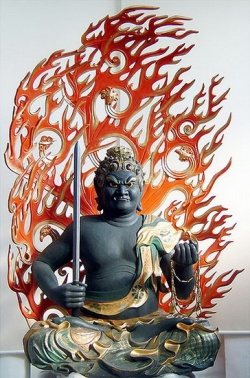Difference between revisions of "Drala or Dralha"
m (Text replacement - "lha" to "lha") |
|||
| Line 1: | Line 1: | ||
[[File:Acala14.jpg|thumb|250px|]] | [[File:Acala14.jpg|thumb|250px|]] | ||
| − | + | [[Drala]] is actually a transliteration for two different [[Tibetan]] terms. Therefore it stands for two slightly different kinds of [[deity]]. One is spelled [[sgra bla]], and the other is spelled in [[Tibetan]], [[dgra lha]]. The first one with the [[element]], [[sgra]] refers to a kind of [[energy]]; it is a vibrational [[entity]]. The second ( [[dgra]] -) [[word]] ends in the {{Wiki|syllable}} [[lha]], and it is a kind of [[god]]. | |
| − | [[Drala]] spelt [[sGra]] | + | [[Drala]] spelt [[sGra bla]] begins with the {{Wiki|syllable}} [[sgra]] which means [[sound]], and continues with la that here means "a type of {{Wiki|individual}} [[energy]] that is endowed with protective functions" (Norbu 1995.) For example, [[seng- ge'i sgra]] means the [[lion's roar]] . It is also possible to write and hence, refer to [[sgra'i lha]] since [[sGra]] means a [[sound]] or cry, but using lha here instead of la conveys the meaning of a [[sound]] [[deity]]. |
| − | The Tibetan term [[lHa]] standing alone means [[god]] or [[deity]] -- usually it refers to one of the [[devata]], a being of the highest realm in the context of The Wheel of Existence. [The syllable [[LHA]] found in transliterated Tibetan is pronounced '''HA'''.] | + | The [[Tibetan]] term [[lHa]] [[standing]] alone means [[god]] or [[deity]] -- usually it refers to one of the [[devata]], a being of the [[highest]] [[realm]] in the context of The [[Wheel of Existence]]. [The {{Wiki|syllable}} [[LHA]] found in transliterated [[Tibetan]] is pronounced '''HA'''.] |
{{R}} | {{R}} | ||
[http://www.khandro.net/mysterious_spirits.htm www.khandro.net] | [http://www.khandro.net/mysterious_spirits.htm www.khandro.net] | ||
[[Category:Local and mountain deities]] | [[Category:Local and mountain deities]] | ||
Revision as of 10:32, 25 February 2014
Drala is actually a transliteration for two different Tibetan terms. Therefore it stands for two slightly different kinds of deity. One is spelled sgra bla, and the other is spelled in Tibetan, dgra lha. The first one with the element, sgra refers to a kind of energy; it is a vibrational entity. The second ( dgra -) word ends in the syllable lha, and it is a kind of god.
Drala spelt sGra bla begins with the syllable sgra which means sound, and continues with la that here means "a type of individual energy that is endowed with protective functions" (Norbu 1995.) For example, seng- ge'i sgra means the lion's roar . It is also possible to write and hence, refer to sgra'i lha since sGra means a sound or cry, but using lha here instead of la conveys the meaning of a sound deity.
The Tibetan term lHa standing alone means god or deity -- usually it refers to one of the devata, a being of the highest realm in the context of The Wheel of Existence. [The syllable LHA found in transliterated Tibetan is pronounced HA.]
